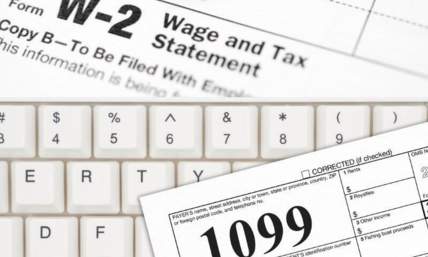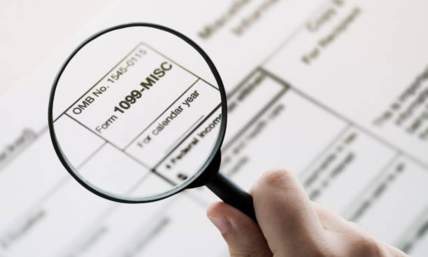How Can You Make Correct 1099 Tax Deductions?
Freelancing can be a dream come true since you get to be your own boss. However, you also accept full responsibility for paying taxes. There are some important factors you should consider when you are operating as an independent contractor.
One essential factor is the type of allowable 1099 tax deductions. Knowing the right tax deductions can help you manage your taxes better.
Many freelancers have questions about taxes and find it challenging to handle them. This applies to both new freelancers and those who have been freelancing for a while.
So, you get questions like “What can I deduct as a 1099 contractor?”. In this article, we’ll answer these questions and many more.
What Are 1099 Status and Tax Obligations?
On a general note, if you’re an independent contractor, you may get a Form 1099-MISC or 1099-NEC. This comes from each client who paid $600 or more in the course of the tax year. Traditional employees are provided with W-2 forms that have taxes deducted from them. Independent contractors are expected to determine taxes on their own.
Independent contractors, freelancers, and gig workers are all self-employed individuals. This is according to the IRS. This kind of classification has its advantages and disadvantages as far as taxation is concerned. The main drawback here is that you are in charge of Social Security and Medicare taxes—both the employer and the employee portions of it. However, you are allowed many tax deductions as a business person.
However, you must complete Schedule C while filing as a 1099 contractor. This means Profit or Loss from Business, to declare your income and expenses. This amount is then reported on your personal Form 1040 tax return. Here, it will be subjected to the current income tax, as well as self-employment tax.
How Much To Save for Taxes as a Freelancer
First-time freelancers usually find it very hard to know how much to set aside for taxes. There is a conventional guide to saving for federal taxes. The recommendation is about a quarter to one-third of your income before tax. That means your gross income.
It includes both the income tax and the self-employment tax for such business organizations. If you are in a state where you are subjected to pay income tax, then aim at putting aside an extra 5-10%.
Do 1099 Workers Pay Quarterly Taxes?
The American tax system is based on the pay-as-you-go approach. Taxes are paid periodically rather than annually. Employees accomplish this through deductions on their checks by their employers. However, self-employed individuals are required to make estimated payments quarterly.
You pay them at least four times a year. That’s if you know you will be paying more than $1,000 in taxes in a financial year. These payments are made four times per financial year, with specific deadlines:
-
April 15: For income earned from January through March
-
June 15: For income earned from April through May
-
September 15: For income earned from June, July, and August
-
January 15: For income earned from September to December
There is a way that a taxpayer can come up with the estimated amount to pay quarterly. You can use Form 1040-ES, which is equipped with a worksheet to help estimate taxes. On the same note, payments can also be made based on the previous year's tax return filings.
The IRS allows you to pay either 90% of the current year's tax or 100% of the previous year's tax. If your adjusted gross income is above $150,000, then it is 110% of the previous year's tax.
Essential 1099 Tax Deductions
You can deduct some ordinary and necessary expenses required for your business. To the list of possible deductions, the following 1099 tax deductions are worth adding:
Home Office Deduction
It is common for self-employed to work from home occasionally. As a result, you may use a portion of their residence only for business purposes. If so, you may be eligible for the home office deduction. To be qualified, the space has to be the main place of business. It also has to be used frequently and exclusively for business purposes.
There are two formulas for this deduction. For the simplified method, you can claim $5 for every square foot of your working space. That is up to a maximum of 300 square feet or $1,500.
The regular method involves determining the business portion of the home. You calculate the percentage of your home you use for business. Then, you apply that percentage to your home expenses. Examples include mortgage interest or rent for the home, utilities and repairs.
For instance, you may have a home office occupying 10% of the space of your home. You can then deduct 10% of all the home expenses that qualify.
Vehicle and Travel Expense Deductions
Many self-employed persons use their vehicles for business purposes. There are two methods for this too.
The standard mileage rate for 2025 is 70 cents for every mile while using the vehicle for business. You take the business miles and then multiply them with this rate. For instance, 1,200 business miles would entitle the payer to a deduction of $840.
The actual expense method means you have to track all expenses related to operating the vehicle. That includes fuel, insurance, repair expenses, and others. The percentage used for business is then deducted. For instance, the car used for business can be 20%, and the total allowance for vehicle expenses is $7,500. Then, the claim amount is $1,500.
Business Equipment and Supplies
Business essentials and necessities are allowed to be deducted. These can include items like pens, pencils, computers, other equipment and software.
There is a small caveat for items that cost more and have a useful life of over one year. It can be more acceptable to reduce the expense over a number of years. This is in contrast to charging it fully in the year of purchase.
However, Section 179 of the tax code permits businesses to immediately deduct the full cost of qualifying equipment. Just that there is a certain maximum, and it has to be the year the item is put to use.
Insurance and Retirement Deductions
Individual health insurance premiums will be allowed. This is provided the person is not eligible for insurance through their spouse’s employer. This deduction can be for yourself, your spouse, and your dependents.
Some other insurance that may be deducted includes:
-
Business liability insurance
-
Professional liability insurance
-
Business property insurance
Freelancer Tax Tips
Efficient planning is an important part of taxes. Here are some freelancer tax tips that will help reduce the amount of taxes you pay:
-
Plan Your Income and Expenses
As much as possible, plan and time your income and expenses. Maybe you will qualify for a lower tax rate next year. You can delay some income to that financial year. On the other hand, you may see that you will be in the higher bracket next year. Then, it’s possible to bring income into the current year.
-
Contribute for Retirement
Most retirement plans are beneficial if you are self-employed. Contributions to SEP IRA, SIMPLE IRA, or Solo 401(k) can lower your taxable income.
-
Consider your Business Structure
Of course, many freelancers work as sole proprietors. Other business structures, such as S corporation, may be appropriate as your business progresses. An S corporation permits paying oneself a reasonable wage. You then get the rest of the income as distributions, which can bring lesser self-employment taxes.
-
Consult Professionals
You can always seek assistance from a tax professional with knowledge of self-employment taxes. They can help you identify other strategies that meet your circumstances.
Bottom Line
Any self-employed individual needs to know how to minimize their 1099 tax deductions to enhance their position. Tax laws are, in most cases, ever-changing. So, try to keep up. To survive and thrive in the freelance market, you do not have to be an expert in taxes. But you need to be armed with the right information and freelancer tax tips. After that, it becomes easy to traverse the maze and concentrate on the core activity of the business.
Stay organized with your freelance income using our pay stubs tool. Our platform lets you generate professional pay stubs. We make tax filing and financial management easier. Keep accurate records and maximize your deductions. Check it out today!














